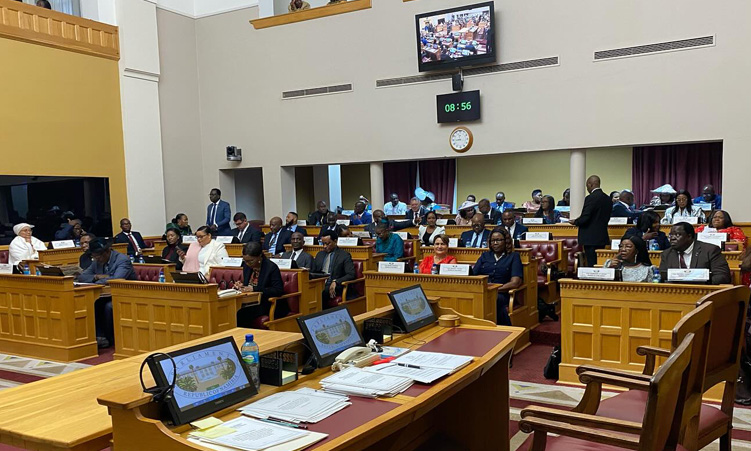OUTJO area farmworker Mathias Simeon received a 25-year prison term in the High Court in Windhoek yesterday for the stabbing that ended the life of a 31-year-old man almost two years ago.
Judge Collins Parker sentenced Simeon (38) eight days after convicting him of murder in connection with a stabbing that left a drinking buddy of Simeon’s, Tobias Johannes Sheya (31), dead at Outjo on November 15 2005. Simeon, a father of six children who insisted on standing trial without legal representation, was convicted of murder without direct intention to kill.Judge Parker rejected his claims that he had acted in self-defence when he stabbed Sheya once in the chest.In his verdict, the Judge concluded on Tuesday last week that Simeon had exceeded the bounds of lawful private defence when he fatally stabbed Sheya during the early morning hours of November 15 2005.Simeon claimed that he had been under attack from Sheya, who he claimed had been armed with a knife.The Judge however found that if indeed there had been an attack, there was no reasonable connection between that attack and Simeon’s claimed defensive act.Simeon and Sheya had still spent the evening before the stabbing in each other’s company, drinking traditional tombo brew at a shebeen at Outjo, the Judge was told.Simeon is no stranger to Namibia’s criminal justice system, it emerged after last week’s verdict.He was convicted of rape in the Otjiwarongo Regional Court and sentenced to an effective prison term of four years in March 1994.He notched up a second conviction – on a charge of assault with intent to do grievous bodily harm – at Karibib in May 1998, when he was sentenced to 30 months’ imprisonment, the Judge was told.While evidence that Simeon had been gainfully employed at the time of the stabbing and that he from time to time sent money to his children for their support had to count in his favour, the previous convictions also had to carry great weight against him, Judge Parker remarked during sentencing.At the same time, the crime he committed was serious, the Judge said: “Doubtless, the killing of the deceased was cruel, callous and unnecessary.If (Simeon) had called for help and taken (Sheya) to the hospital, probably he would have lived.”Instead, Simeon left the wounded Sheya lying on the ground and went to a shebeen in the early morning hours to continue drinking, not caring what happened to his victim, Judge Parker said.He also commented on the fact that a knife had been used in the killing, and that knives were frequently the weapons of choice when murders were committed in Namibia: “One does not need to go far to see that the society is sick and tired of young persons senselessly knifing one another and killing themselves.Doubtless, the community is repulsed of this culture of stabbing-by-knife killings, which appears to have taken cruel and evil root in our society.”In his view, the Judge continued, the courts had a duty to assist in combating “this culture of stabbing-by-knife killings” by imposing sentences that will also convey “to individuals who wish to dabble in the culture” the message of society’s condemnation of such crime and its determination to be rid of such crimes.State advocate Lucius Matota suggested last week that Simeon should be sentenced to 35 years’ imprisonment.Judge Parker decided that between 25 and 30 years would be appropriate.Taking into account that Simeon had spent two years in custody before his trial was finalised, the Judge imposed a jail term of 25 years.Simeon, a father of six children who insisted on standing trial without legal representation, was convicted of murder without direct intention to kill.Judge Parker rejected his claims that he had acted in self-defence when he stabbed Sheya once in the chest.In his verdict, the Judge concluded on Tuesday last week that Simeon had exceeded the bounds of lawful private defence when he fatally stabbed Sheya during the early morning hours of November 15 2005.Simeon claimed that he had been under attack from Sheya, who he claimed had been armed with a knife.The Judge however found that if indeed there had been an attack, there was no reasonable connection between that attack and Simeon’s claimed defensive act.Simeon and Sheya had still spent the evening before the stabbing in each other’s company, drinking traditional tombo brew at a shebeen at Outjo, the Judge was told.Simeon is no stranger to Namibia’s criminal justice system, it emerged after last week’s verdict.He was convicted of rape in the Otjiwarongo Regional Court and sentenced to an effective prison term of four years in March 1994.He notched up a second conviction – on a charge of assault with intent to do grievous bodily harm – at Karibib in May 1998, when he was sentenced to 30 months’ imprisonment, the Judge was told.While evidence that Simeon had been gainfully employed at the time of the stabbing and that he from time to time sent money to his children for their support had to count in his favour, the previous convictions also had to carry great weight against him, Judge Parker remarked during sentencing.At the same time, the crime he committed was serious, the Judge said: “Doubtless, the killing of the deceased was cruel, callous and unnecessary.If (Simeon) had called for help and taken (Sheya) to the hospital, probably he would have lived.”Instead, Simeon left the wounded Sheya lying on the ground and went to a shebeen in the early morning hours to continue drinking, not caring what happened to his victim, Judge Parker said.He also commented on the fact that a knife had been used in the killing, and that knives were frequently the weapons of choice when murders were committed in Namibia: “One does not need to go far to see that the society is sick and tired of young persons senselessly knifing one another and killing themselves.Doubtless, the community is repulsed of this culture of stabbing-by-knife killings, which appears to have taken cruel and evil root in our society.”In his view, the Judge continued, the courts had a duty to assist in combating “this culture of stabbing-by-knife killings” by imposing sentences that will also convey “to individuals who wish to dabble in the culture” the message of society’s condemnation of such crime and its determination to be rid of such crimes.State advocate Lucius Matota suggested last week that Simeon should be sentenced to 35 years’ imprisonment.Judge Parker decided that between 25 and 30 years would be appropriate.Taking into account that Simeon had spent two years in custody before his trial was finalised, the Judge imposed a jail term of 25 years.
Stay informed with The Namibian – your source for credible journalism. Get in-depth reporting and opinions for
only N$85 a month. Invest in journalism, invest in democracy –
Subscribe Now!










